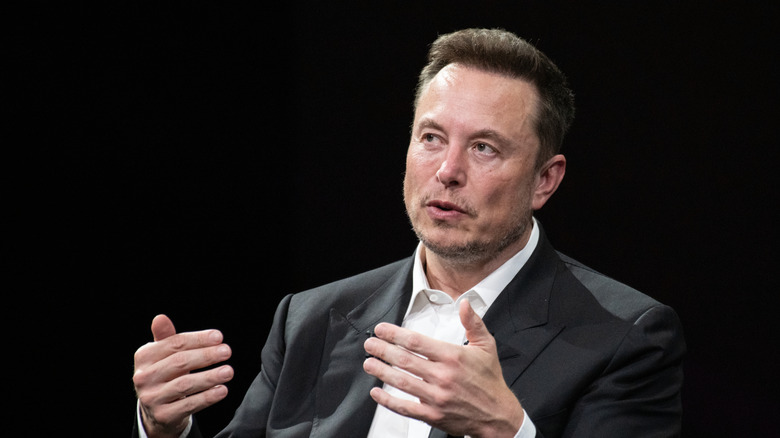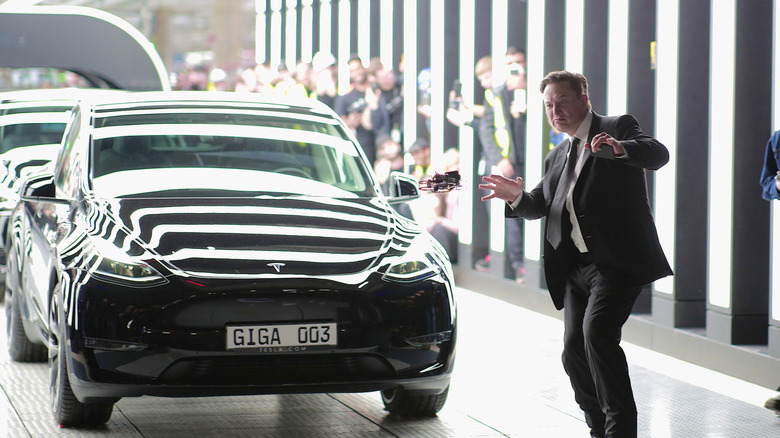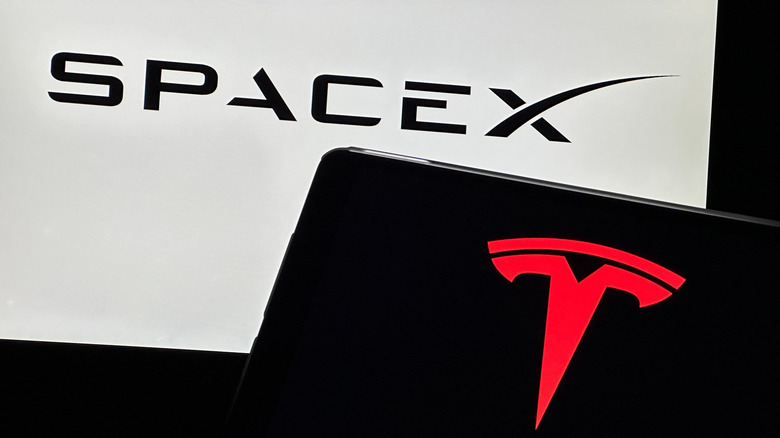Elon Musk's Most Valuable Asset Isn't Tesla Anymore
Elon Musk didn't start Tesla Motors, though many people assume he did. The company was actually founded in 2003 by Martin Eberhard and Marc Tarpenning. Musk got involved early, leading the first big investment round and becoming chairman of the board. His ambition — electric cars that are eco-friendly, fast, stylish, and competitive — helped push Tesla beyond just an idea into a $1 trillion market cap in 2024. But ambition doesn't control the market. Lately, market shifts have taken Musk's portfolio in another direction.
Musk's Tesla shares have been on a rough ride lately with a 15% drop on March 10, 2025 — the biggest single-day fall since 2020. Musk reacted to this by lashing out online. There's even been reports that Tesla shares have gone down weekly since the November 2024 presidential election. Yet, Tesla isn't Musk's only major player anymore. His businesses are becoming more connected, forming a network of innovation that goes beyond cars. Starlink's satellite internet could help fund future Mars missions, while Neuralink's brain tech might one day work with AI systems developed at X (Formerly Twitter). Tesla may have built his empire, but it's no longer the only thing driving his legacy forward.
Tesla's stock decline, and investors' cry out
Tesla's stock has taken a serious hit, tumbling from nearly $480 per share in December 2023 to just over $233 by March 2025. That's a 55% drop, wiping out billions in market value. For Musk, the impact is even bigger — his Tesla holdings are now worth $127 billion, trailing behind his $147 billion stake in SpaceX for the first time in over five years. In essence, Tesla is no longer his most valuable asset.
Investors aren't staying quiet about it. Ross Gerber, CEO of Gerber Kawasaki Wealth Management and a longtime Tesla supporter, has openly called for Musk to step down as CEO, Fortune reported, saying his leadership is stretched too thin and he is too distracted. Between managing X (formerly Twitter), making political statements, and dealing with legal battles, Tesla isn't getting the attention it needs. Meanwhile, real challenges are piling up: Electric Vehicle (EV) demand is slowing, Cybertruck production is behind schedule, and Chinese automakers like BYD are pushing hard into the market.
Tesla's slump isn't just about stock price — it's about confidence. While the company is still the EV market leader, its grip on the industry isn't as strong as it once was. Analysts warn that Tesla's profit margins are shrinking, and while its energy storage division is holding steady, it hasn't been enough to balance out the company's financial struggles.
If not Tesla, what's Musk's most valuable asset
SpaceX has officially taken the top spot in Elon Musk's portfolio, now worth $350 billion after a December 2023 stock buyback. His $147 billion stake in SpaceX has surpassed his Tesla holdings, marking a major shift in where his wealth and attention is heading. SpaceX is excelling in three key areas. First, its low-cost, reusable rockets have completely changed the economics of space travel. Second, Starlink is expanding fast, now serving over 4.6 million users worldwide. And third, government partnerships are fueling growth, with big telecom deals in India through Bharti Airtel and Reliance Jio.
While Tesla struggles with slowing Electric Vehicle demand, SpaceX controls 90% of U.S. payload launches and keeps pushing toward interplanetary travel. Its Starship rocket finally reached orbit in 2024, a crucial step toward Musk's Mars ambitions. Meanwhile, Starlink's revenue is projected to hit $11.8 billion annually by 2025, a stark contrast to Tesla's shrinking margins.
Musk's path back to a $400 billion net worth now leans more on SpaceX's dominance in space infrastructure than on Tesla's fight to stay ahead in the EV market. While Tesla battles BYD, shifting regulations, and slowing demand, SpaceX is charting a different course; one with far fewer obstacles and much bigger ambitions.


